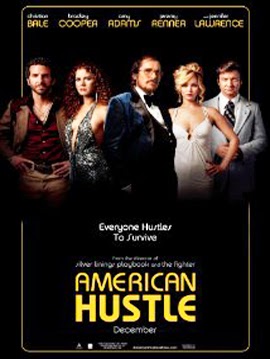In contrast, American Hustle isn't anything close to neo-noir nor is it really a crime drama or dark comedy as some critics called it. The richly entertaining and engaging film is more akin to a character study that straddles the late 1970s and early 1980s.
The characters themselves aren't down to earth but rather vivid, larger-than-life characterizations of transformative times. America was settling into the changes won by an earlier decade. The protests were over and so was the hangover. Plenty of people had nothing to prove anymore.
American Hustle is a foreshadow to the self-indulgent eighties.
The film itself is loosely based on a Federal Bureau of Investigation (FBI) sting operation commonly referred to as Abscam. The investigation began as a simple stolen property sting that wandered off course to become a full-scale public corruption investigation. Even so, the movie itself doesn't stick to the sting.
It could have, but director David Russell rewrote Eric Warren Singer's screenplay specifically to create caricatures out of the characters who more closely resembled real life counterparts. Doing so gave Russell more liberty to capture the controversy of the case rather than its procedural trappings.
At the same time, the script allows Irving Rosenfeld (Christian Bale) and Richard "Richie" DiMaso (Bradley Cooper) to trade places as Rosenfeld seeks redemption and DiMaso slips toward narcissism. Likewise, Sydney Prosser (Amy Adams), as Rosenfeld's illicit girlfriend and partner in crime, is contrasted with his wife Rosalyn Rosenfeld (Jennifer Lawrence). They undergo similar but uneven transformations, leaving the audience to wonder which has Rosenfeld's best interest at heart.
Much like the historical investigation, Russell and his well cast troop of actors leave you wondering who is more ethical (if anyone) and what constitutes justice. In the historic case, 31 officials were targeted. One senator and six representatives, plus five other government officials were convicted.
The American public was split in their reaction, with half supporting the FBI and half believing the department had entrapped their marks as a means to seek revenge for previous criticisms. The film never touches on this implication. Russell pins most of it on the ambition of one man (and several others who are all too willing to enable and benefit from it).
A couple graphs about David Russell as a director.
After a string of moderately successful but not very enduring films and one disaster that will likely never be seen, Russell redeemed his career with the The Fighter, a brilliant biographical sports drama that brought together Mark Wahlberg and Christian Bale to tell the story of Micky Ward's rise to claim the WBU Light Welterweight title.
He followed up this film with Silver Linings Playbook and American Hustle, which were both propelled by positive critical reviews and three Golden Globe wins, including Best Motion Picture Comedy. It also received almost a dozen Academy Award nominations but no wins.
Russell took an interesting path into film direction, first majoring in English and political science at Amherst College and then working as a union organizer in New York and literacy teacher in Boston. In his spare time, he wrote scripts and eventually interned with Smithsonian World for PBS. When he completed his internship, he returned to produce a film short, Bingo Inferno, for Sundance (1987).
American Hustle By David Russell Wrestles In 8.8 On The Liquid Hip Richter Scale.
The film's inability to be confined to a single genre opens it up to mixed reviews from anyone, except the critics who were immediately taken in by the portrayal of pronounced caricatures and the artistic qualities of the film. It is memorable, a real treat for anyone who appreciates the detail and the era.
American Hustle by David Russell is available on Amazon and for rent on iTunes. You can also learn more about the film on its international release site or order a physical copy of American Hustle from Barnes & Noble. The movie, more than anything, is about people looking for something better, usually from the feet up.
![Liquid [Hip]](https://blogger.googleusercontent.com/img/b/R29vZ2xl/AVvXsEjAFBQPqS7J0-rrttNoRYSsuwIePPZf4Nq6sqDioK1zzVQXJIQXKzq_NVNI4n6h3inuRQFBKOcJeZeSufkdHHIOxbSWyBjTjTxgKEQGyPzdwvkEEeECh4bI5YEGk4RWGUINSd7vulPQsCA/s1600-r/liquidhip.jpg)

